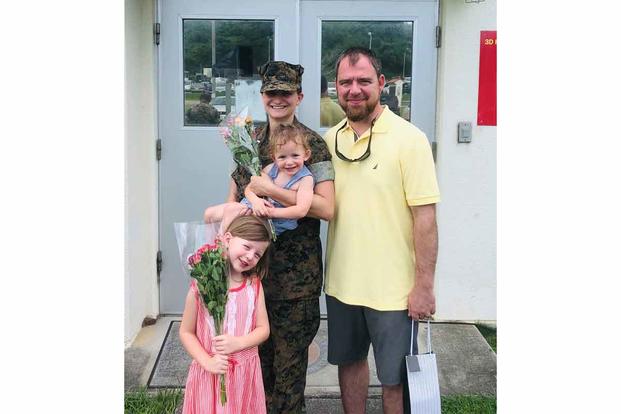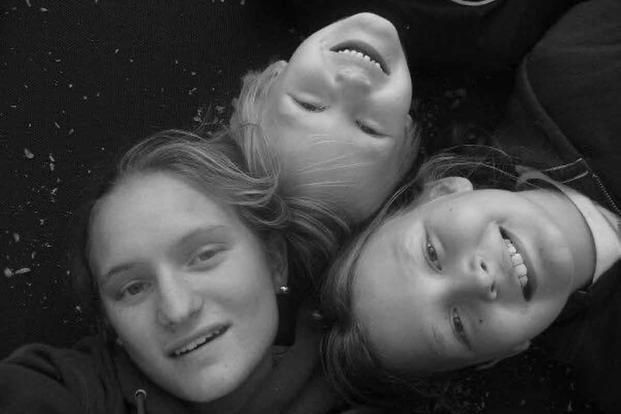In early 2019, Danielle Falcon sat in her Marine Corps cammies, huddled in her car in an empty lot outside Camp Courtney, in Okinawa, Japan. Tears streamed down her face as she breathed heavily, dreading the drive home.
Falcon had what any Marine officer dreams of: She'd recently pinned-on the rank of major and was serving as a company commander, right on track for battalion command one day when she'd be tasked with overseeing hundreds of troops. She was married to a loving husband, a dependable and involved father to their two girls, ages 3 and 6. She loved her job in intelligence, and she was good at it.
But in her car, none of that mattered.
Read Next: Austin Orders Renaming of Bases that Honor Confederate Rebels
"I felt very alone," she said.
It wasn't depression or stress from work that kept her from pulling out of that parking lot after another 12-hour day. Falcon had begun having physical effects from her mental health, ending up in the hospital a few times. Any amount of routine stress had become overwhelming. She thought she might be dying, leaving her children without their mom.
It was panic built on past trauma.
The vast majority of Americans grow up experiencing some level of trauma. But compared to those who've never served, the military has a disproportionate number of adults who experienced higher rates of childhood trauma.
That trauma is tied to a range of adult health issues, such as suicide, heart disease and even cancer.
For Falcon the long term effects came in the form of terror built on an echo of her past. "My life felt like it was starting to mirror my dad's in a lot of ways."
A decade before, when she was just 19 and away at college, Falcon unexpectedly found herself unable to reach her father. She called her grandparents, asking them to swing by and check on him. They found her father, Jeffery, along with two of Falcon's sisters, dead inside his home. He'd died by suicide, and killed her sisters, Haley, 10, and Zoey, 5, at the same time.
"I started wondering how you could do that to your own children, the fear of somebody else hurting my kids," she said.
She couldn't sleep and was becoming scared of family members. For a while, she was able to conceal her fears at work, confining breakdowns to long drives or when she was alone in the office.
But by 2020, Falcon's fear and anxiety couldn't be stashed out of sight anymore. She was sure the escalating panic was surging toward a bad end.
She'd spent much of her time setting up mental health appointments for her Marines, battling notoriously long wait times to get them help. She wondered about pursuing an appointment for herself, having spent years repeating the mantra that she'd get over what happened.

Adverse Childhood Experiences
Talking about the effects of trauma, which experts call "adverse childhood experiences" (ACEs), can help mitigate health issues. But there's no apparent effort within the military to raise awareness, despite some reports pointing to links between veteran suicides and histories of pre-service trauma.
There's further cause for the military leadership to care: ACEs may be contributing to another of the military's most enduring and public struggles -- rates of sexual assault.
When children experience more instances of trauma, their chances of being sexually victimized as an adult go up. The likelihood of committing crimes increases too, and so do the chances that a person will be a perpetrator of sexual assault. Risk of suicide rises as well, in some cases by fourfold.
"We know that childhood adversity has an enormous effect on adult functioning throughout life," said Dr. Ronald Kessler, a Harvard professor and researcher who has studied trauma and military mental health extensively.
The idea of ACEs was born from a study in the 1990s, when researchers realized participants who reported different types of childhood trauma were more likely to suffer long-term mental and physical health consequences, because of debilitating stress.
"You look at people who are in their 60s and you can see the differences in mental health, relationships, and the ways they connect with people -- that stuff's all related," Kessler said. "When you probe what was going on with them and you do a life review, that's all related to things that happened when they were a little kid."
Although Falcon wasn't a child when her father and sisters died, the most devastating effects of their deaths didn't emerge until years later.
"When I had my first daughter, the trauma just kind of slapped me in the face," she said. "I think sometimes we think of trauma as being linear, like 'time heals all wounds'. But when I had my daughter, the trauma changed. I think that's when I went from grieving to actually starting to display signs of PTSD because now that trauma meant something else, I had my own child."
The birth did trigger Falcon's PTSD, which wouldn't be diagnosed until seven years later, a few years after the birth of her second child. She medically retired from the Marine Corps in 2021 and started seeing a therapist.
"When I started talking [to my therapist] about the loss and trauma, though, it was terrible because it brought back so many emotions. But it also lifted a burden I didn't realize could be taken off of me," Falcon said.
Experts say more research on the long-term health consequences of ACEs in military populations is sorely needed. The Defense Department doesn't collect ACEs data either, making it hard to determine how significantly ACEs may be contributing to readiness issues such as personnel retention, health issues of non-deployable troops, and rates of misconduct and crime.
"Part of the challenge is getting people to realize how much they've oriented their view of the world -- their perceptions of danger and opportunity -- based on their unique experience," Kessler noted. "And getting them to realize that other people may have ways of being in the world that are a lot more fulfilling, productive and happy, and that they could do that too, because they're not in that childhood home anymore."
Understanding how old traumas could play out in later years can only benefit those who serve, says Army Lieutenant Colonel Scott Stephens, an armor officer stationed in Europe. A former battalion commander, he's encountered the devastating effects of unrecognized trauma over the years, both personally and professionally. He argues that a lot of what he’s seen could be helped if only troops know how to process what they’re grappling with.
"Often, the pieces of the puzzle are there, but they're scattered on the table or still in the box," he said. "Usually, you know if someone's been in combat and carries something from that. But I've known people who've died of suicide and only afterward have we found out there was major childhood trauma they were carrying too."

What Pre-Service Trauma May Look Like
Part of lifting burdens like Falcon's -- and improving mental health in the military -- is understanding how traumatic events experienced as young people can shape adults.
Marine Corps Major Anna Antoine spent almost a decade on active duty before swapping to the reserves to pursue a career in firefighting. It's a job that includes routine exposure to trauma and people affected by it. She’s not a doctor, but after almost 17 years as both a Marine and firefighter leading men and women, she's no stranger to those effects, and how issues that go unresolved can affect a team's cohesiveness in dangerous environments.
"It's the whole 'know yourself and seek self-improvement' thing," Antoine said. "Knowing the role that our ACEs play in our current understanding of our environment makes us more resilient and lethal fighters."
Survivors cope with old traumas consciously or subconsciously. Anger issues, compulsive sexual behavior, alcoholism and drug use, overworking and overeating are all ways people can deal with toxic stress.
"We don't have a solid way to address this anywhere in American society yet," she continued. "We're getting better, but asking the military to address something that our society hasn't fully figured out yet is a big task."
One of the most complicated issues may be child sexual abuse. Victims are often abused by adult family members, or even other child family members, leading to harsh stigmas and lifelong secrecy. It's severely underreported, by some estimates affecting 1 in 10 children.
Dr. John Blosnich, a research health scientist for the VA, found that military men are twice as likely to have suffered child sexual abuse as children, putting them at increased risk of suicide.
"We don't fully understand how people recover from childhood trauma," he said, adding that the military may attract people who are already inclined to resilience, and who seek to overcome traumas by serving.
Antoine recounted one experience with unresolved pre-service trauma. She'd once had a young Marine working for her who'd been showing up to work drunk, unbeknownst to the unit. "She was acting kind of weird, but we chalked it up to personality. We couldn't smell any alcohol and didn't know she was drunk at the time," she said.
Antoine only learned about the Marine's drinking after she attempted suicide and was subsequently hospitalized.
"When I met her afterward, she told me she was raped in high school, and she'd never told anybody. Drinking had been her way of dealing with it."
Service members like Antoine are left to try to help those who have experienced trauma, many of whom aren't aware that those past experiences might be driving their current mood and behavior.
"I'm not a psychologist and I'm not a therapist," Antoine stressed. "But the people I've met while serving who've shared their stories with me, I can see they've never broken those patterns. It's playing out over and over again and coloring everything they're doing, but they don't see it because they're stuck in an emotional loop."
"It doesn't have to be like that," Antoine said.
Falcon said that although the DoD provides mental health care, if people aren't taught how to identify issues before they hit a tipping point, many won't use those resources.
"I think a lot of people understand military mental health services that are out there," she said. "But they don't understand their own issues, so they don't know how the services can help."
Falcon says she still has bad days, sometimes made worse by her acute awareness of how her trauma has shaped her. But one of the biggest positive changes for her now that she's getting help has been being able to feel joy.
"I'm able to have stronger connections with family and friends and develop relationships differently. I want to be able to feel joy with my kids. And I get that a lot more now than I was able to prior to starting therapy, even though the burden hasn't completely been lifted."
"Joy" as a concept may not register with Congress and DoD budget makers. But money might.
The exact national financial cost of dealing with ACEs is uncertain, and there's no data on how ACEs impact military populations economically. But in California, ACEs as a public health crisis is estimated to cost the state more than $113 billion each year. That figure includes health care costs related to long-term toxic stress, and projected years of lost economic production due to early deaths.
Preventing more long-term health issues could reduce costs for the Department of Veterans Affairs, which has requested a 13% budget increase from last year -- almost $302 billion for fiscal 2023.
Falcon, Antoine and Stephens all said that training on how trauma can shape behavior would be an effective tool in helping troops recover and prevent more serious health or misconduct issues. It's already a known concept amongst social workers that seems to overlap with military personnel issues.
"So often, I have seen senior leaders tell Marines dealing with trauma say, 'It's all in your head' or 'That's not a big deal' or 'I went through the same thing, and I'm fine,'" Falcon said. "Hopefully trauma training prevents those statements ever being said to a struggling Marine again."
Related: How the Army Made Me Choose Between My Mental Health and Our Family's Dream Posting








